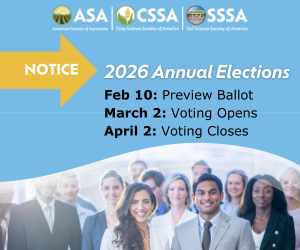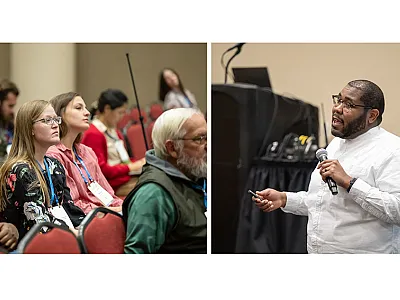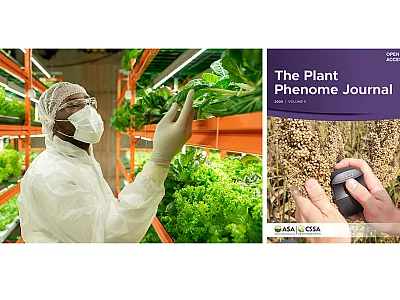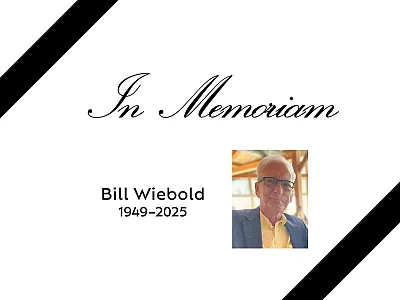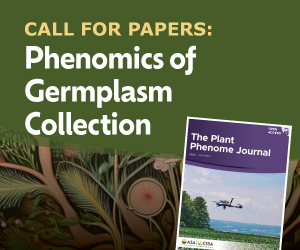Continuing our Work to Improve Diversity, Equity, and Inclusion
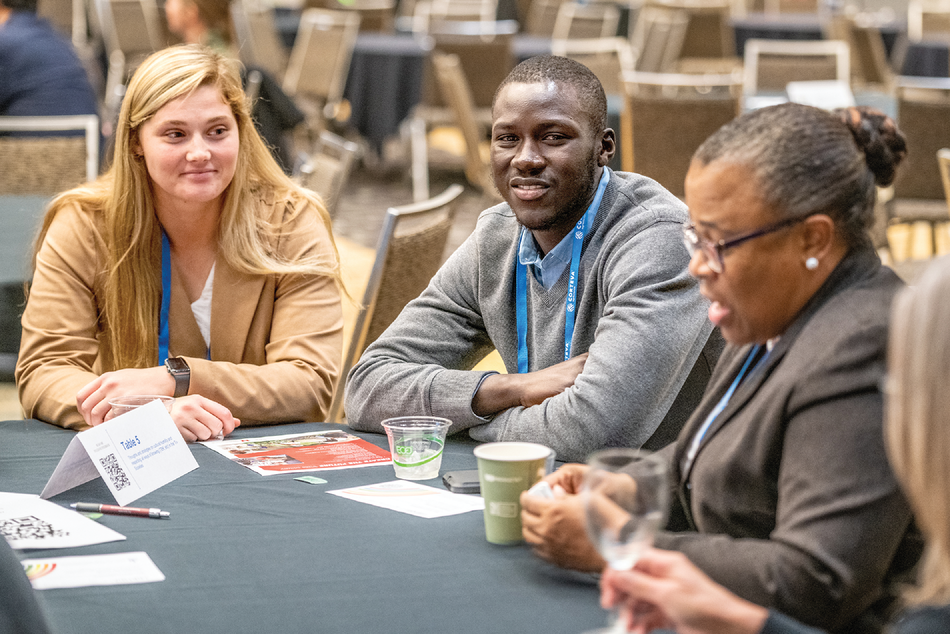

Given that we are about to undertake a new strategic-planning process this year, it is timely to reflect on our past strategic plan. I’d like to specifically focus on one of the three overarching 2020–2023 CSSA strategic plan objectives of “inclusion and diversity”; now also commonly incorporating ideas around equity and typically discussed using an acronym (DEI or EID). The last strategic-planning process meeting occurred in June of 2019 and was finalized May of 2020. At that time, our scientific Society was not alone in prioritizing DEI. It was an emerging zeitgeist catalyzed by numerous external events and racial unrest occurring nationally and internationally.
These events made many individuals, especially those holding power, more aware of the ongoing problems historically marginalized communities face. Problems that had long existed but which we did not see or had simply not prioritized. For CSSA, this helped us to recognize that some marginalized groups are underrepresented among our scientific Society (Table 1) compared with science or agriculture generally; naturally leading to questions of why that is and how we can best support these groups.
The strategic plans of ASA and SSSA also have objectives centered around DEI as do most other scientific societies, universities, and corporate institutions. Institutional support for DEI is important to ensure that all members and stakeholders are invited, included, and engaged throughout organizational activities; this includes diversity of thought and diversity of representation. For CSSA, we expect that underrepresented groups have the biggest potential for membership growth in the future, including internationally. We recognize that younger generations, who we need to continue our Societies, view DEI and associated values differently and often with more importance than past generations (Smith & Turner, 2015). Further, our industry partners and members embrace DEI with evidence suggesting diverse teams and companies improve in productivity metrics that matter (Gompers & Kovvali, 2018). Including and supporting others globally who experience systemic barriers is the morally right thing to do as we seek to help others feed themselves and “feed the world.”
Table 1. How do the demographics of our Societies relate to the U.S. population, agricultural professions, and earned doctorates?
| ASA, | U.S. | Agricultural | Agricultural | Earned | U.S. | Hired |
|---|---|---|---|---|---|---|---|
| Female | 28% | 36.1% | 35% | 39% | 50.8% | 50.5% | 27% |
| Asian | 9.4% | 0.6% | 9% | 5% | 5.3% | 6.1% | NR |
| Black/ African American | 2.4% | 1.3% | 2% | 8% | 4.4% | 13.6% | 3% |
| Caucasian / White | 83.6% | 95.4% | 81% | 69% | 75% | 59.3% / 75.8%* | 44% |
| Hispanic | 2.2% | 3.3% | 7% | 15% | 9.5% | 18.9%* | 50% |
| Native Hawaiian / Other Pacific Islander | 0.5% | 0.1% | NR | NR | 0.05% | 0.3% | NR |
| American Indian / Alaska Native | 0.2% | 1.7% | NR | NR | 0.5% | 1.3% | NR |
| Other / More than one race | 1.9% | 0.8% | NR | NR | 2.9% | NR | NR |
Note. NR, not reported.
a Source: CSSA (https://www.crops.org/diversity); b Source: USDA-NASS (https://www.nass.usda.gov/Publications/AgCensus/2017/Full_Report/Volume_1,_Chapter_1_US/st99_1_0052_0052.pdf); c Source: Pew Research Center (https://www.pewresearch.org/social-trends/2018/01/09/stem-appendix-detailed-tables-and-charts/); d Source: Pew Research Center (https://www.pewresearch.org/social-trends/2018/01/09/stem-appendix-detailed-tables-and-charts/); e Source: NSF (https://ncsesdata.nsf.gov/explorer/datatables?superTopic=Fields%20of%20Study and https://ncsesdata.nsf.gov/home); f Source: U.S. Census Bureau (https://www.census.gov/quickfacts/fact/table/US/POP010220); g Source: USDA-ERS (https://www.ers.usda.gov/topics/farm-economy/farm-labor/#size).
Progress Made Since 2020
Reflecting on activities since 2020 within CSSA as well as ASA and SSSA, substantial efforts have been made to improve DEI. Leadership invited members’ thoughts and interests in DEI activities and identified ways to address them (crops.org/diversity). Our Society has since sought to become more welcoming and supportive to the barriers various individuals face and resourced this with deliberate investments.
These events made many individuals, especially those holding power, more aware of the ongoing problems historically marginalized communities face. Problems that had long existed but which we did not see or had simply not prioritized. For CSSA, this helped us to recognize that some marginalized groups are underrepresented among our scientific Society (Table 1) compared with science or agriculture generally; naturally leading to questions of why that is and how we can best support these groups.
The strategic plans of ASA and SSSA also have objectives centered around DEI as do most other scientific societies, universities, and corporate institutions. Institutional support for DEI is important to ensure that all members and stakeholders are invited, included, and engaged throughout organizational activities; this includes diversity of thought and diversity of representation. For CSSA, we expect that underrepresented groups have the biggest potential for membership growth in the future, including internationally. We recognize that younger generations, who we need to continue our Societies, view DEI and associated values differently and often with more importance than past generations (Smith & Turner, 2015). Further, our industry partners and members embrace DEI with evidence suggesting diverse teams and companies improve in productivity metrics that matter (Gompers & Kovvali, 2018). Including and supporting others globally who experience systemic barriers is the morally right thing to do as we seek to help others feed themselves and “feed the world.”
With an unrestricted gift from the estate of Dr. Sarah Lingle, the Agronomic Science Foundation (ASF) started a $250,000 “IDEAS” fund (a-s-f.org/asf-ideasfund) to financially support initiatives such as the caregivers award, which helps to defray costs of taking care of children or loved ones so that members can fully participate in our Annual Meeting. We have been deliberate in resourcing activities supporting DEI at our Annual Meeting, scheduling such activities to avoid conflict in the program and having an DEI-professional ombudsperson for reporting incidents. We have added DEI representatives as voting members to all Society Board of Directors, and as of 2023, included a member to represent DEI on the Annual Meeting planning committee. We have reached out to groups like Minorities in Agriculture and Natural Resources (MANRRS) and the Society for the Advancement of Chicanos/Hispanics and Native Americans in Science (SACNAS) to create partnerships. We have encouraged and facilitated DEI training among our leadership, members, and staff.
Nevertheless, we have far to go, especially for our membership and leadership to reflect demographics of our stakeholders. Currently, we can increase awareness and learn how to best support those with underrepresented and marginalized voices.
What Needs to Be Done to Make Substantive Improvements
One of the most challenging components for advancing DEI is that many who can make a difference in addressing systemic issues in representation are often unaware of their own power to make change. In a graduate class I teach, we discussed a thought-provoking and provocative article that showed how white males in physics who believe they support DEI are unwittingly undermining these goals through small actions and inactions (Dancy & Hodari, 2022). One of my students asked, “How would this article be different if a white male had written it?, and why had they not?” Other students expressed frustration that DEI student organizations are often populated with very few white males talking about improving DEI.
To truly improve DEI and meet our strategic objectives, white males (CSSA’s largest proportion of members; Table 1) need to first invest in educating themselves. As a white male child of an academic, who grew up near a major U.S. university, DEI training has taught me to recognize biases in my mindset that I had taken for granted. I am convinced I do a far better job in engaging and supporting first-generation students, female students, black, Hispanic, and LGBTQ+ students with the awareness I’ve obtained through DEI training; including aiding them to attend our Annual Meeting and to build appropriate mentor networks. Expanding diversity in thought helps us to include and appropriately support each stakeholder towards equality; critical for our Society’s future success. As with any job function we seek to excel at, education, research, and discourse around DEI is required.
Emerging Hostility in Response to DEI
It is therefore troubling to see emerging hostility in response to the DEI initiatives aimed at increasing diversity of thought and the ability of our institutions to support non-majority groups. Educational efforts centered on DEI are now being politicized. Anti-DEI initiatives are being proposed at both federal and state levels. Specifically, there are proposals to eliminate DEI officers at universities, eliminate mandatory DEI training and eliminate DEI statements for faculty positions (Kelderman, 2023). Some faculty search committees request DEI statements to help contextualize candidates’ past experiences, to evaluate candidates’ potential to adequately support students of different backgrounds, and to add diversity in thought among a department. For the first time, administration at one major public university has prohibited search committees from requesting DEI statements from job candidates (McGee, 2023).
Historical cautionary tales of political influence on the direction of science exist from Vavilov and Lysenko (Borinskaya et al., 2019) in the human eugenics movement (Farber, 2008) and more recently with biotechnology and climate change. As we consider the future of CSSA, and scientific societies in general, we must focus on how to support diversity, equity, and inclusion in scientific research, teaching, and outcomes, being mindful that such efforts may increasingly be thought of as political statements by others. I humbly request members to work with CSSA to create that just society so eloquently described by Martin Luther King in his “I Have a Dream Speech”; a profound vision of what the world should be delivered 60 years ago.
References
Borinskaya, S.A., Ermolaev, A.I., & Kolchinsky, E.I. (2019). Lysenkoism against genetics: the meeting of the Lenin all-union academy of agricultural sciences of August 1948, its background, causes, and aftermath. Genetics, 212(1), 1–12.
Farber, S.A. (2008). US scientists’ role in the eugenics movement (1907–1939): A contemporary biologist’s perspective. Zebrafish, 5(4), 243–245.
Gompers, P., & Kovvali, S. (2018). The other diversity dividend. Harvard Business Review, 96(4), 72–77.
Kelderman, E. (2023, 20 January). The plan to dismantle DEI. The Chronicle of Higher Education. https://www.chronicle.com/article/the-plan-to-dismantle-dei
McGee, K. (2023, 8 February) Texas Tech reviews its hiring practices as efforts to promote diversity come under fire. The Texas Tribune. https://www.texastribune.org/2023/02/08/texas-tech-hiring-diversity/
Smith, C., & Turner, S. (2015). The radical transformation of diversity and inclusion: The millennial influence. Deloitte University. https://bit.ly/3J4wpSO
Text © . The authors. CC BY-NC-ND 4.0. Except where otherwise noted, images are subject to copyright. Any reuse without express permission from the copyright owner is prohibited.



